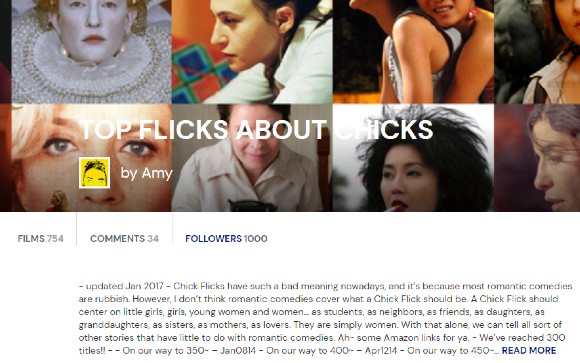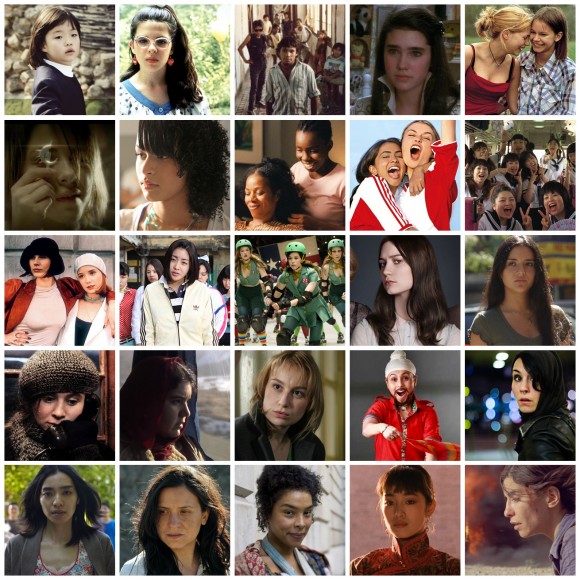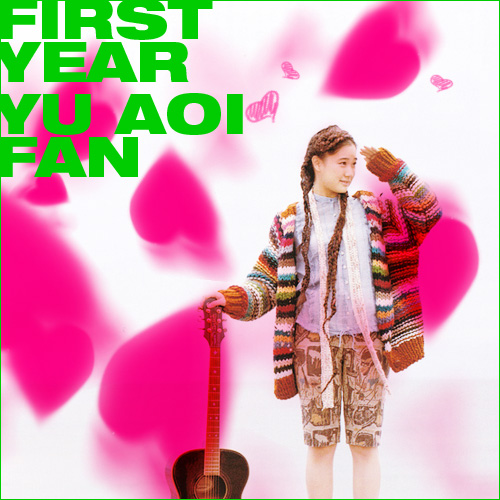It took a while, but

Happy 1000th fan!

If you aren’t following the list yet, you might discover a gem or two!

It took a while, but

Happy 1000th fan!

If you aren’t following the list yet, you might discover a gem or two!
I really can’t remember exactly when I started out the Top Flicks About Chicks list on MUBI, but it must have been around the same time I wrote how Chick Flicks was a doomed genre in regards of critics. So it might be almost 4 years… and I’ve finally reached 300 titles in the list!!!
A Chick Flick should center on little girls, girls, young women and women… as students, as neighbors, as friends, as daughters, as granddaughters, as sisters, as mothers, as lovers. They are simply women. With that alone, we can tell all sort of other stories that have little to do with romantic comedies.
The purpose of the list, of course, was to encompass an array of female character — not only in the binary sense, since the list also includes men/boys who identify as women/girls… and viceversa — of various cultural, ethnic, social backgrounds. Not favoring one genre over the other, not valuing dramas over comedies… just simple stories about different women.
Though I’m sure the list could be longer, that’s 300 feature length films out of the 2896 (counting shorts) currently rated on the site- that’s roughly 10% so I suppose the list could expand to up to 500 or maybe 1000 once I reach 5000 or 10000 rated films on the site.

I picked 25 of the 300 films to illustrate some of the variety (I hope it’s AS varied as I intend the list to be), though I ran out of picks and couldn’t include any of the ‘older’ female characters. If I could pick 5 more, they’d be: Lemon Tree, Frozen River, Late Bloomers, Mother, For 80 Days.
I haven’t actively looked for Yu Aoi fan-made videos in a long time, but here we go~ I hope this one doesn’t get deleted, coz we’ve been suffering from that a lot lately. Regular Yu Aoi film footage applies, with nice additions of Tamatama, and Otouto… though, Raiou would have been nice to have.
A regular person would have 8 or 9 films, on this video you’ll get to see clips for 27 films (though a few of those are just blink and miss them, or just a still). I’ve seen most but 6 films, I think. I’m still looking for 1980, and JUKAI.
Plus, this is the best way to choose what Yu film you wanna watch~ xD
[iframe src=”https://www.tudou.com/v/ozVm6oSk6p8/v.swf” width=”480″ height=”400″]
check post tags for movie info. some missing because they’re not on this blog.
by the way, Ikechan looks sooooo weird. I wonder if the movie is any good.
This is my last post for this blogathon, unless I can come up with something on time for tomorrow~
I was reading this post on Japanese Films and Women in Cinema– now, female in cinema is a big BIG subject. I’m not in the position to point out feminists or non-feminists films across the decades or countries. However, I have to admit that looking back at the films I’ve seen the past year, it feels like many (if not most of them) have a female protagonist. In general, I don’t know the reason – if there are more films about women, or if I’m watching them because I’m looking for them. What I do know is that I watched many Japanese films with female leads because I had been on the hunt for Juri Ueno and Yu Aoi projects – so that’s got to be at least 10 films led by a female, right?
So here it is… some~
Of course, there’s many animated films asides from the ones I’ve mentioned above like Paprika, Princess Mononoke, Spirited Away, The Milennium Actress or Perfect Blue. And yes, there are films in my list that are not quite remarkable… and we can also point out that there aren’t many female leads of over 30 or 40 (in some way, Matsuko which chronicles her life, The Makioka Sisters, GuGu, and The Witch of the West – who knew Shirley McLaine’s daughter spoke Japanese?), but then again… that’s a problem that seems to be common in Hollywood too. Does it happen much in Europe? Countries like France or Germany? Are there many films with female leads, or are they as hard to find??
In the end, it was good to see Meryl Streep (Doubt), Melissa Leo (Frozen River), Julie Christie (Away from Her), Laura Linney (The Savages), and to some degree Kate Winslet (The Reader) and Marion Cotillard (La Vie en Rose) getting recognition these past two years.
— EDIT June 21 —
I thought this was a great post on the subject. =D
WOOOOOO!! A freakin’ year~~~~

Today a year ago, I was introduced to Yu Aoi’s work on Shunji Iwai’s All About Lily Chou Chou, and the Shunji Iwai-related Rainbow Song. Little did I know that the characters that interested me the most in the films were played by the same actress. Nine days later, I watched Hula Girls, and a month later I was completely hooked with Yu Aoi, and yet another Shunji Iwai film… Hana & Alice.
 Watching Welcome to the Quiet Room, and listening to Yu Aoi’s Miki character telling Asuka she doesn’t eat because whatever she eats means that someone else more worthy doesn’t get to eat it, totally left me cold. I wondered what was the situation of eating disorders in Asia, since it’s ‘common knowledge’ that Asians are genetically skinny.
Watching Welcome to the Quiet Room, and listening to Yu Aoi’s Miki character telling Asuka she doesn’t eat because whatever she eats means that someone else more worthy doesn’t get to eat it, totally left me cold. I wondered what was the situation of eating disorders in Asia, since it’s ‘common knowledge’ that Asians are genetically skinny.
*sighs* I ended up reading quite a few articles dealing with the issue as far back as 1999 until this year. Throughout all of them, there is an emphasis on cases on bi-racial young women, or women living in a bi-cultural environment. Taking the example of Chinese-American or British-Chinese women who weren’t as self-conscious about their weight living on this side of the world, but would get ‘picked on’ back in Asia because they tend to be ‘bigger’.
But I wasn’t too interested in those particular cases, I was trying to find how common are these eating disorder cases in other cultures, particularly Asia. I always thought Asians were thin naturally… always thought they’re skinny and love food. That’s what I’ve always seen in my family. It’s also noted on many of the articles that this value for food comes from the terrible years of starvation they went through in countries like China, India, Cambodia… even Peru where there still exists malnourishment. It is a crime to not eat, when there’s people who have nothing to eat. Yes, that’s why Quiet Room totally freaked me out… it was the first time I had heard that reason~~~ So there are eating disorders much more complicated than the “I want to be thin” one, for bi-cultural people is the “I want to be white”, for others it’s the sense of taking control over their lives…
Something about the film:
Quiet Room ni Youkoso is a 2007 dramedy telling the story of Asuka Sakura, a up-and-coming journalist who is trying to write an 800-character article, but one day wakes up and finds herself strapped inside the room of a psych ward. Inside, they tell her she had OD’ed, even when Asuka tells them it was an accident, they say she must go through mental treatment so she won’t do it again. During that time, she meets a few unique people that will or won’t mark her for the rest of her life…
Genre: Dramedy… mind you, Drama is pretty straight forward, but Comedy is pretty dark.
Starring: Yuki Uchida, Kankuro Kudo, Yu Aoi
Appearances by: Ryo, Shinobu Otake, Yuko Nakamura, Mai Takahashi, Satoshi Tsumabuki, Hideaki Anno, Shinya Tsukamoto, Kami Hiraiwa
Duration: Almost 2hrs
Spoilers ahead, you’ve been warned. Really, these spoilers may ruin your watching…